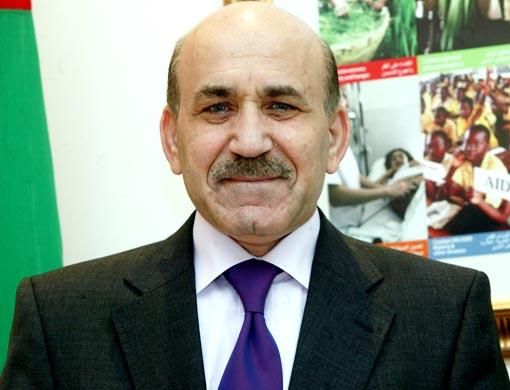Last October, about 43.7 million people – including 86,179 UAE residents – set a new Guinness World Record for the biggest mass mobilisation in history.
The 'Stand Up and Speak Out' campaign was intended to revive the commitment made by world leaders in 2000, when 189 United Nations member states pledged to halve extreme poverty by 2015.
That commitment is enshrined in the Millennium Development Goals, and the millions who stood up last year did so to jog their leaders' memories to achieve those eight goals.
For most people who participated, the campaign was about wearing the white rubber bracelet and the T-shirt, and showing they care enough to stand up for a few moments.
But for Dr Khalled Alloush, the campaign against poverty struck a chord on more than one level.
As Resident Representative for the United Nations Development Programme (UNDP), he was responsible for organising the campaign in the UAE in association with the International Association for Human Values (IAHV) and the Art of Living.
But unlike others, Dr Alloush has first-hand experience in the evil he is campaigning against. He knows what it is to grow up as a poor farmer's son in rural Syria, one of 10 children. He knows about going without food or money for days and understands that education is the only way to escape the curse of grinding poverty.
Dr Alloush, who is also the UN Resident Coordinator, overcame tremendous odds to reach the point at which he stands today. With a PhD in economics and demography, he is a champion of education and is outspoken in his views on many of the ills that plague the region.
Having spent over 20 years working for the UNDP, this father of two teenagers and former professor of economics is used to answering even impertinent questions calmly and with patience.
Wouldn't the UNDP's talents and resources be better employed in the poorer countries of the region rather than a highly developed one like the UAE?
Dr Alloush explains that the UNDP is involved in several areas, from sharing expertise and training for governance to protecting the date palm.
But rather than grassroots involvement, this involvement is at the top level. More importantly, the UN's presence in a country is only by invitation. In other words, if a government does not want it, the UN will not be there.
Given all his successes, what is his biggest life lesson? "When a person decides to do something, he or she can achieve it," he answers with a smile.
I
I started my career as a high school teacher in Syria. After teaching for three-and-a-half years, I found that the job, though very interesting, did not satisfy my aspirations. After that I went on to complete my studies.
I am very happy to be in the UAE as part of the UNDP. The UAE is a strong supporter of the UN system in general. I represent the UNDP in the UAE and Qatar. At the same time I am the UN Resident Coordinator; in other words representing the UN and its operations in the UAE. Times have changed since the UN first came to the UAE in 1977.
The country has undergone a near-revolutionary social and economic transformation. Clearly the UAE's needs of the UN today are very different from those of a poor country in Africa or somewhere else.
I have spent a little over 20 years working with the UN in the Middle East. It is a region with great contrasts between individual countries. Why is this so? It is not easy to give one answer.
Me
Me and poverty
I had a rough childhood. When I speak of poverty, it comes from having experienced it for many years, and from not having had money for days, even to buy food. I connect poverty with my own notions of life until high school.
I grew up in a little village 10 km out of Hama city in a big family – two sisters and seven brothers (one of our brothers died.)
My father was a farmer, and until the end of high school, I worked on our farm. We didn't have big farms in Syria, just smallholdings where we grew seasonal crops like wheat and cotton.
Agricultural technology was non-existent, and nearly all the people in rural Syria at the time were poor.
They couldn't have afforded to send their children to school if the government hadn't provided free primary education.
When I was growing up, we had no electricity, running water and sanitation system in our village. (Of course, things have changed now.) I completed primary school in my village, but we did not have a high school, so I moved to the city to study for the next six years of high school. With every successive year, the expenses increased. My father had a hard time finding the funds to educate my brothers and me.
In Grade 10 I wanted to quit school and join the military, but I failed the military entrance exam and realised that the only way out for me was education. I had to study and get a high grade to get a scholarship.
I took very tough majors and spent many hours studying. For me university was beyond my wildest dreams. I could not imagine how I was going to make it to a place so many hundreds of kilometres from home (Damascus) and find a room to stay without any financial help from my father.
Me and graduating
In high school, I graduated as a top achiever. On account of my performance, I was offered a graduate scholarship by the government. I was the first in my family to study at university.
I enrolled in Damascus University, where I continued to work hard, earning a small stipend as well. I graduated with the highest-ever scores, earning a BA in Economics.
Because of the conditions binding my scholarship, I had to work with the government after graduation for three-and-a-half years. I got a scholarship for higher education in the US, awarded by the United Nations to the government of Syria. All my education after high school has been supported by scholarships.
For my family, I became the example to follow. I sponsored my younger brother's education in the US as well. (He now has two postgraduate degrees.)
Landing in the US in 1977 was a major turning point. It was a different environment, which brought on a different set of responsibilities.
After I returned to Syria, I started working in Damascus University's College of Economics as an instructor, and then in various government ministries. From 1982 till 1987, I was
the Director of the Centre for Social and Population Studies in Damascus. In 1987 I resigned to join the UNDP.
Me and the UN
In 1987 I was offered an opportunity at the UNDP. I started my career with them as National Programme Officer for UNDP Syria, where I spent a little over four years. My next posting was as Senior Assistant Resident Representative for UNDP in Sudan.
I worked there until September 1995. From September 1995 until August 1999, I was Deputy Resident Representative for UNDP in Yemen. My next posting was in Saudi Arabia as the kingdom's Deputy Resident Representative.
We stayed there for three years, before relocating to Bahrain where I became UN Resident Coordinator and Resident Representative, and I am now in the UAE.
My time in this region has been very interesting. Being from this region, I am a bit biased because I truly consider all these countries my own. We have enjoyed ourselves beyond measure in these countries and we feel we are at home.
That feeling makes it difficult to pick a favourite! While the GCC countries' high standard of living makes it nice to stay there, the least developed countries are professionally more rewarding.
From a professional point of view, working in poorer countries like Yemen or Sudan is the most challenging and enjoyable. You feel that your contribution has a direct impact on the lives of people.
That is not to say that the contribution we make to advanced countries is without value, but the impact is indirect. In poor countries, one gets to work at the grassroots, and people show appreciation for what you do.
Me and my family
I am married with two children. My daughter is 19; she is at university in Boston. My son is in high school in Abu Dhabi. For me, the children's education is a top priority. So far, we have managed to provide our children with a good education, and we hope to continue to do that.
My wife is a homemaker by choice and also circumstances: in almost all the countries we were posted in it was not possible for her to pursue a career for legal or other reasons. Now she likes to paint as a hobby.
Myself
The UAE is classified as a high development index country, as well as a higher per capita income. So what is the UNDP doing here? Firstly, the UNDP is here because the UAE wants it to be here. The UAE is a member of the UN family, and hence it is entitled to have a UN presence.
We have several projects within the UAE: we provide technical expertise at upper levels like in the Ministry of Economy. We can give expertise in the areas of budget, management and strategic planning.
We are happy to partner with the government in this.
The UN system also identifies priorities. For instance, for us, supporting government to improve the governance system is something worth doing. Supporting women is another area that is a high priority for us. Gender equality is one of the Millennium Development Goals.
Sometimes the UNDP responds to the government's request, whether it is in environment, economic management, improving the public sector/private sector relationship, encouraging export or facilitating WTO discussions.
How long will you stay in the UAE?
We have a system whereby rotating resident representatives normally stay in a country for three to five years depending on how advanced the country is. In my case, I am about to complete two years in the UAE.












